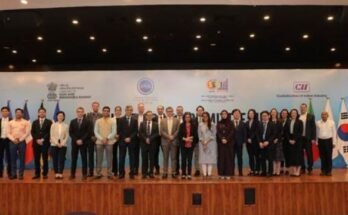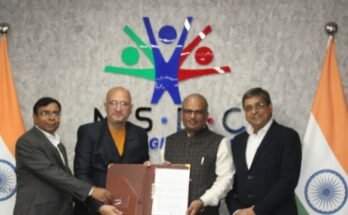Policy think tank NITI Aayog has released its Ease of Doing Business Enterprise Survey Report – in this report the think tank has made a bunch of recommendations which include labour reforms as well as better implementation of reforms.
In fact in a conversation with CNBC-TV18’s Shereen Bhan, NITI Aayog’s outgoing Vice Chairman Arvind Panagariya highlighted some of the implementation challenges. He also stressed on the need for better flow communication – as he talked of the fact that awareness on single window clearance is still low amongst Indian businesses. Panagariya also agreed that it is still a long road when it comes to ease of doing business in India, but added that things have improved after 2014.
Below is an excerpt of the interview.
Q: As I pointed out, this three year action plan does cover pretty much the entire ambit of the Indian economy, but if I were to start by asking you about what I know to be one of your key concerns and that is employment, employability and within that, the whole aspect of skills development. If I could start by asking you about the recommendations that you have made there and also where you believe programmes that have already been implemented by the government, for instance the skills development programme, what have been the shortcomings and what needs to change, what needs to improve?
A: You are asking wide-ranging questions, but a broad answer first which is that virtually every area we cover in the action agenda has a ministry that looks after that particular subject and therefore, we ought to move along on all fronts. If each ministry were to do its job, I think we can move forward on every front.
That being said, if you would insist on me stating certain priorities, I would say, as I have repeatedly said on your show before, creation of jobs which pay good wages, that is priority number one and that of course, means manufacturing. So we need to pay special attention to manufacturing and within that to labour intensive manufacturing and we lay out a number of policy steps that we can take to strengthen our labour intensive manufacturing.
Then, I would also say a big priority, which compliments this move on manufacturing, we got all the growth enablers and as we call them, in the action agenda, these would span things like infrastructure, energy, digitisation, innovation and entrepreneurship, a whole host of these things, we would need to work on. And then the social sectors, education and health.
Q: Let me start by asking you specifically on the issue of skills development and I think that through the course of your action plan, there is acknowledgement that perhaps the skills development initiatives undertaken by the government have not necessarily worked. In fact even if we look at the data and this is according to the NSDC data, the placement rate of people who are actually getting skilled is under 50 percent and you are suggesting that the placement rate has to be as high as 80 percent. Now what has gone wrong or what has been the shortcomings of what has been undertaken so far and how do we bridge that gap from 50 to 80?
A: We have made the suggestions there. One thing I feel we need to do is to bring together the demand and supply. So in skill development, we need to have the industries more directly involved. That can be done, say for example, through apprenticeship. So if we really scale up our apprenticeship programmes, which can now be done in the context of some of the key amendments that were made to the apprenticeship act, I think that will connect the demand and supply more directly and that ought to raise the proportion of those are given skills that are also employed.
Then also, we need to align better the exact skills that are required in the marketplace even if not through apprenticeship, but directly, we need a better sense of what is in demand. And if we do those things, I think we would certainly begin to raise our hit rate meaning the proportion of those who get employed after being skilled.
Q: You have also recommended a National Level Overseas Employment Promotion Agency and you believe that this should be housed under the Ministry of External Affairs, but what is it that India will need to do to ensure that this is an idea that actually takes off and what has been the buy in that you have got from other ministries that you have spoken to, specifically with respect to this National Level Overseas Employment Promotion Agency that you have recommended?
A: In the course of writing the action agenda, we have worked closely with the ministries and with the states as well. So there is some basis for the recommendations that we have made. So again, how far we are able to go, we will have to wait and see.
Q: Let me talk to you about education and what you talk about there is the overhauling of the University Grants Commission (UGC) Act and I know, this has been something that Niti has been working on for a while now. When it actually goes through is a separate matter, but on the point that you talk about that rather than micro-managing universities, you believe that there needs to be a focus on information disclosure and better governance. Now how do you ensure that from happening and as you have gone about preparing these recommendations, are you disappointed with the current state of affairs as our educational governance is concerned, the governance of our educational institutions is concerned?
A: A short answer is yes, because our higher education system has been in need of reform for a very long time. I have been writing on this for about more than 10 years. Good news, however, is that we are actually moving on this front very quickly. There was a committee under my chairmanship which I think has done its last meeting and will soon be submitting a report and our report is very much actions instead of simply laying down very elaborate roadmaps.
So, we are talking about autonomy, both to the universities and to the colleges. So, that is going to be a really truly major reforms, something that has not happened in a long time and has been long overdue.
We would recommend moving to some sort of a layered regulation whereby some of the top universities are given near-full autonomy and then we have some second category where we also give a lot more autonomy. So, that is going to be a major change. This change will eventually need to be made permanent through a legislative change.
Currently, we can do this change through rules, but eventually, to make this permanent so that future changes in the rules do not reverse what we are suggesting, we would need a legislative change. So that means a University Grants Commission Act will have to be amended.
Q: How confident do you feel that perhaps, in the next session of parliament, we will see this legislative amendment being moved to the UGC Act itself?
A: I do not think we can get that sort of amendment in the next parliament session simply because for now, we need to actually work what exactly would be the form of the new legislation whether this will be an amendment to the existing UGC Act or we need a new legislation. So that work still needs to happen.
It will have to be then, vetted by not only the HRD Ministry, but of course also at other levels. And then it has to go to Cabinet. So there is a longer process, but the effective change will happen, will be put in place before that amendment because we are doing it through the changes in the rules within the existing UGC Act.
Q: Since we are talking about higher education, let me also ask you about the Right to Education Act itself, because there has been criticism on the Right to Education Act and how it may have encouraged enrolment, but in terms of quality, it has fallen significantly short. So what is the key recommendation when we talk about how we could perhaps make the Right to Education Act a lot more effective?
A: Number of things need to be done. For one thing, the Right to Education Act is very input driven kind of act where schools are required to provide certain physical infrastructure facilities to be recognised. But I think we need to move towards more outcome based so that is one of the recommendations we have made.
We have also, through the Right to Education act, not allowed the tension at all until all the way to the eight grade. That has also had a detrimental impact on our achievement levels of the students. So we need to re-introduce the tension because remember, it existed before and the Right to Education Act had outlawed it. So that also needs to be done. And the ministry is already looking at that.
From Niti Aayog, we have introduced something called the education index which is also very outcome based and through the education index we have already begun to monitor the states and that will be our competitive federalism kind of effort so that the states can begin to see where they stand relative to the other states. And that would generate some competition to improve the outcomes.
Disclaimer: The excerpts of the interview have been taken from the conversation conducted by Shereen Bhan, CNBC-TV18. SkillReporter shall not be responsible for any damage caused to any person/organization directly or indirectly.



